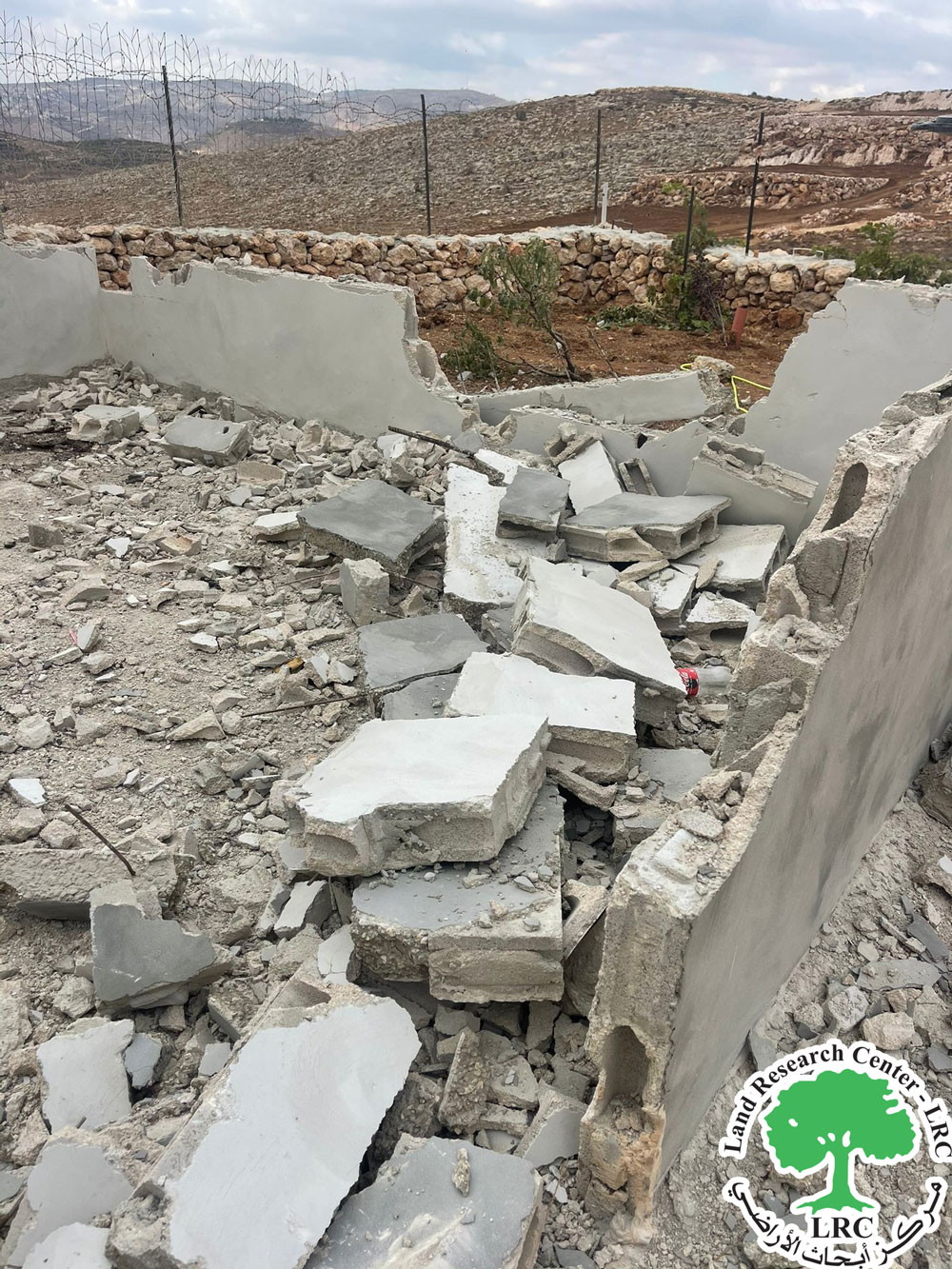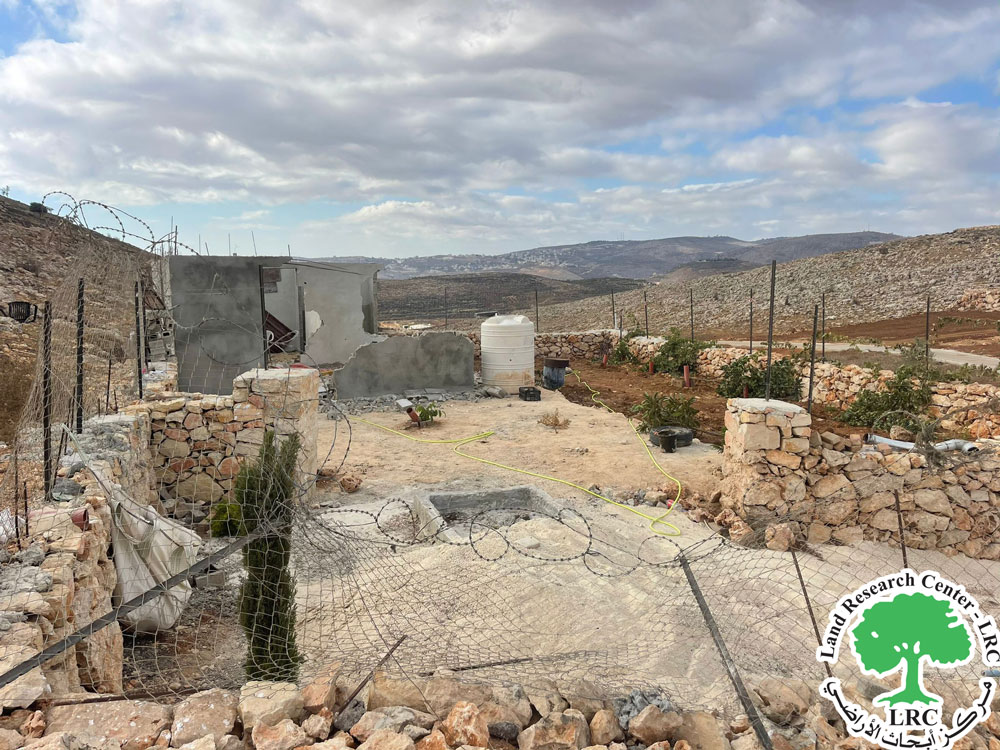2024-06-30
Settlers Cut Trees and Destroy Agricultural Room in Khirbet Abu Falah East of Ramallah
- Violation: Assault on trees and demolition of an agricultural room.
- Location: Khirbet Abu Falakh / Ramallah Governorate.
- Date of Violation: June 30, 2024.
- Perpetrators: Settlers.
- Affected Party: Citizen Montaser B-Allah Nasser Abu Karsh.
Description:
A group of settlers, coming from a recently established outpost on lands of the town of Turmus’ayya, stormed the area of "Al-Safha" east of Khirbet Abu Falah, northeast of Ramallah, early on the morning of Sunday, June 30, 2024. They targeted a piece of land measuring 1.5 dunams owned by farmer Montaser Ahmed Abu Karsh (40 years old) from Khirbet Abu Falah.
The settlers uprooted and damaged approximately 14 newly planted grape, citrus, and ornamental cypress trees within the farm. They also demolished parts of a 16 square meter brick agricultural room located on the citizen's land, using manual tools to tear down the room’s walls. Additionally, the settlers stole a three-phase electrical generator worth 12,000 shekels, as well as other electrical and agricultural equipment.
 |  |
Damage to Montaser Abu Kresh’s property
The affected farmer reported to the Land Research Center’s researcher:
“I planted the land three years ago, located 2 km from the village homes. The farm is situated east of the village near the bypass road known as Alon Road. On Monday morning, when I went to my farm, I was shocked by the damage done by the settlers, which ruined most of the trees I had planted, and other farm contents were also not spared. I reported the incident to the Palestinian liaison office, which documented the event.”
Khirbet Abu Falah:
Khirbet Abu Falah is located northeast of Ramallah, with a population of approximately 4,200 as of 2020, according to Palestinian census indicators. The total area of the village is 8,254 dunams, of which 750 dunams are designated for building. The village lands are classified as follows:
- Area (A): None.
- Area (B): 8,219 dunams.
- Area (C): 28 dunams.
Attacks by Settlers and the Israeli army against agricultural chambers with the aim of destroying lands and preventing farmers from reaching their lands:
The targeting of agricultural rooms built by Palestinian farmers for storing tools and resting after farming activities (plowing, irrigation, weeding, spraying pesticides, etc.) is intended to deter Palestinian farmers from accessing their lands. This creates fear and hinders their access, facilitating land appropriation.
The Land Research Center has recorded over 350 settler attacks on agricultural facilities in the West Bank, including East Jerusalem, since the beginning of 2024 up to the date of this report. Settlers have targeted over 60 agricultural rooms through burning, vandalizing, and theft.
The Israeli army has demolished 21 agricultural rooms built on farmland and threatened 10 other rooms.
Legal Commentary:
The Palestinian environment is subjected to numerous environmental violations by the Israeli occupation, disregarding all relevant international and national environmental protection laws. The right to live in a clean and healthy environment is inherent to humanity. Despite Israel’s signature on major environmental agreements such as the Basel Convention (1989), Rotterdam Convention (2008), Stockholm Convention (2001), and Ramsar Convention (1971), and air and climate quality charters, these treaties are violated without accountability.
International covenants grant the right to a clean environment to those under military occupation. For example, the International Covenant on Economic, Social and Cultural Rights (UN General Assembly Resolution 2200 thausand (D-21), December 16, 1966, Article 1, Clause 2) states: "All peoples may, for their own ends, freely dispose of their natural wealth and resources without prejudice to any obligations arising from international economic cooperation based on the principle of mutual benefit and international law. In no case may a people be deprived of its own means of subsistence."
It is clear that the actions carried out by the Israeli side violate not only international laws but also the laws of the so-called "occupying power" itself. According to the details of this case, the Israeli Penal Code of 1977 and its amendments stipulate that the violation of someone else's property for the purpose of committing a crime is punishable under the law. Article 447 states:
"Anyone who commits any of the following with the intent to intimidate, insult, or harass the property owner, or to commit a crime, shall be punished with imprisonment for two years: (1) entering or crossing the property; (2) remaining on the property unlawfully after having entered it legally. (b) A crime under this section is committed when the perpetrator carries a firearm or a cold weapon, and the penalty is imprisonment for four years."
Reading this article, it is evident that the Israeli Penal Code criminalizes the mere act of entering someone else's property without right with the intent of insult, harassment, or intimidation, punishable by two years' imprisonment. The penalty increases if the perpetrator commits a crime on the property using a weapon or engages in acts of cutting, burning, or vandalizing agricultural land, as clearly criminalized by the aforementioned article of the Israeli Penal Code.
Therefore, the Israeli perpetrator blatantly violates not only international laws and treaties but also the internal laws of the "occupying power" itself. There is a necessity for the "Israeli judiciary" to hold settlers accountable and punish them according to their own legal provisions. However, there is no legal accountability for the perpetrators by the Israeli judiciary. This does not negate the right of any person on this land to live in a clean, sound, and safe environment free from any violation or attack.
- مشروع: حماية الحقوق البيئية الفلسطينية في مناطق "ج" SPERAC IV - GFFO
Disclaimer: The views and opinions expressed in this report are those of Land Research Center and do not necessarily reflect the views or positions of the project donor; the Norwegian Refugee Council.
إخلاء المسؤولية: الآراء ووجهات النظر الواردة في هذا التقرير هي آراء ووجهات نظر مركز أبحاث الأراضي ولا تعكس بالضرورة وجهات نظر أو مواقف الجهة المانحة للمشروع؛ المجلس النرويجي. للاجئين
